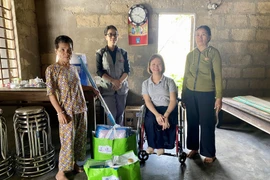Thetrainees are mostly selling products online or working to become saleco-ordinators of brands.
Despitelosing their eyesight, they believe they can take advantage of digitalentrepreneurship opportunities and technology empowerment to have stable jobs duringthe turbulence of the pandemic.
LuongThi Hai Yen, a visually-impaired trainee, said blind people like her, withvoice assistance and support from others, can use computers to learn digitalbusiness knowledge and skills to approach customers and how to advertiseproducts.
Likemany other blind people, Yen’s main job used to be at a massage parlour inHanoi.
Morethan 100 massage parlours and other service venues which provided jobs forvisually-impaired people in the capital city were closed as non-essentialservices during the COVID-19 social distancing period earlier this year.
Beingamong millions of people with disabilities nationwide who lost their jobs dueto the COVID-19 pandemic, with consultation from others, Yen decided to learnmarketing skills and sell perfume online.
Sheacts as a sale co-ordinator who advertises products, orders the perfume and hasit delivered to customers and can earn a stable source of income during thepandemic.
“Forvisually-impaired people, selling products online has some difficulties. Forexample, we cannot advertise products through images. Instead of doing that, welivestream, write descriptions to make advertisements or directly consultcustomers,” she said.
“Thedisabled have limited ability to move around. Thanks to technology, we areconnected with the outside world so that we know how the world is developingand what chances, including job opportunities, are available for us,” shetold Vietnam News.
TranTrung Hieu, Chairman of the Vocational Training Centre of the Hanoi BlindAssociation, said those with visual impairment and the disabled in general areamong the hardest hit by the pandemic.
Accordingto the United Nations Development Programme (UNDP)’s Rapid Assessment onSocio-Economic Impacts of COVID-19 which interviewed more than 900 people withdisabilities in Vietnam in May, 30 percent lost their jobs during COVID-19.Neatly half had their work hours reduced, and almost 60 percent had their paycut.
Upto 72 percent of the interviewees had an income of less than 1 million VND (44USD) in March when the first wave of the pandemic peaked in Vietnam.
“Notonly facing challenges during the COVID-19, but people with disabilities alsohave difficulties in the fourth industrial revolution. They have little accessto information technology,” Hieu said.
Withthe support of the UNDP and Japanese government, the four-month course willprovide digital skills training for people with different disabilities toadapt for digitalisation after COVID-19.
Manyof the trainees have already started to run their businesses or practise onlinemarketing skills.
“We[the disabled] have been present on the internet and are ready to engage in thesupply chain,” Hieu said.
DaoThu Huong, UNDP Vietnam’s disability rights officer, said working online fromhome helps people with disabilities cut travel costs and minimisetravel difficulties caused by traffic. While working at home, they can getpersonal assistance when needed, face less discrimination and be betterprotected from psychological pain.
NguyenHanh Thu, a disabled English teacher in Hanoi, believed that with tools likecomputers or tablets, people with disabilities can do their jobs, earn incomesand reduce the pressure on their families.
Thusuffers from spinal cord injuries and has been in a wheelchair for 30 years.Over the past 30 years, she has been running free English classes for poorstudents, those in disadvantaged circumstances and people with disabilitieslike her.
Dueto the impacts of COVID-19, she has made use of the internet to offer onlineclasses to her students.
“Ialways encourage my disabled children to learn English and informationtechnology skills and then use digital technology to earn money. That’s howtechnology works for the disabled,” she said./.





























